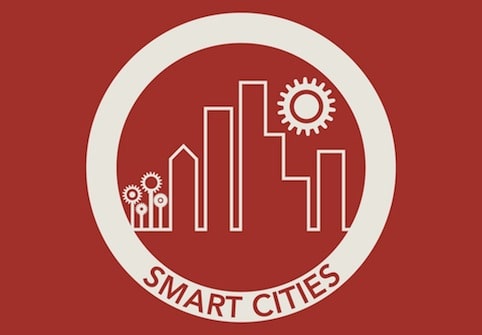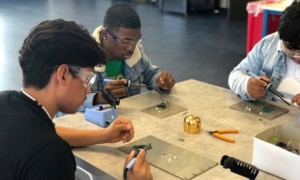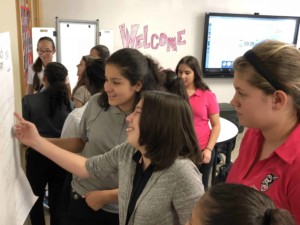Smart Cities: Houston’s Low Tech Lift Off

“Houston, unlike other cities, is insanely entrepreneurial and optimistic. It incubates the hell out of new ideas,” said nonprofit leader Rhetta Detrich. She would know; she helped build Education Pioneers national network. Lacking the provinciality of East Coast cities, “Houston exists because it was founded on the premise of outsiders bringing good ideas and industry.”
The fifth largest metropolitan area in the country is a giant sprawl. Its haphazard development makes the case for zoning laws. Home to energy, aerospace, and manufacturing companies, only New York City is home to more Fortune 500 headquarters.
Regional demographics are changing fast. In the next 20 years, the Hispanic college-age population will grow by 70 percent and make up the majority (55 percent) of the 18-24 year old population. Educate Texas says that metro Houston “has a cohesive sense of regional identity, a high level of philanthropic activity and support, numerous innovative pilot programs showing promising results, large college systems that can help support smaller regional institutions, and growing coordination among K-12 and postsecondary institutions.”
Suburban Houston includes big diverse districts recognized for their achievement includingAldine ISD, the 2009 Broad Prize winner. Katy and Klein are recognized as tech savvy districts. Katy ISD was an early adopter of social learning platform Edmodo. Klein ISD is rolling out a tablet PC program.
Backstory. After a distinguished career in the military and higher education, Dr. Rod Paige served five years on the Houston school board before becoming superintendent in 1994. Dr. Paige focused the systems on key outcomes, decentralized budgets and decision making, and introduced new options including charter schools and a program that became the KIPP network. After completing a two-year Teach for America (TFA) commitment, Dave Levin and Mike Feinberg launched a program for fifth graders.
Like similar efforts with high profile leaders — Seattle and New York — the accountability and autonomy agenda in Houston boosted achievement levels, laid the groundwork for the portfolio strategy deployed in many urban districts today, but fell short of transformation. These early decentralization efforts overestimated school-based capacity capacity and the resilience of the secondary school model. Dr. Paige went on to serve as Secretary of Education for President George W. Bush from 2001 to 2005.
Governor Perry and I met right after an economic development luncheon in 2004 where he asked, “how do we connect education to emerging industries?” I said, “Open three dozen new schools linked to college and careers.” The Texas High School Project, now Educate Texas, was launched a few weeks later and has resulted in 10 Early College High Schools and and nine T-STEM schools in metro Houston. Every state should have the equivalent of Educate Texas.
Texas lags many states in online learning opportunities . The state agency provides online learning opportunities to students across the state through the TxVSN statewide course catalog using a network approach. The tortured process results in few full and part time online opportunities and tiny enrollments compared to other states. Houston ISD sponsors the Texas Connections Academy @ Houston, a statewide virtual school for grades 3-8, and an in-district virtual high school.
Full court press. Houston has some of the best charters schools in the country. KIPP has 21 schools serving 9,000 students. YES Prep, the inaugural winner of the Broad Prize for Public Charter Schools, has 11 schools. The innovation they pioneered was universal college access–both networks routinely propel 100 percent of students to college.
In 2009, the Gates Foundation provided a $30 million credit facility to support $300 million of KIPP facilities development. The Fisher Fund and the Walton Family Foundation have been significant donors to KIPP and YES in Houston.
As reported last week, the Houston Independent School District applied lessons from high performing charters when it launched Apollo 20, an ambitious turnaround program.
Houston ISD recently passed a $1.9 billion bond to build or renovate 40 schools, a giant opportunity to develop next gen schools combining lesson from Apollo with emerging blended learning models.
Impact Partnerships. Based on data about what drives college success among low-income students, YES Prep developed the IMPACT partnership. This innovative program works with colleges and universities who agree to take a ‘cohort’ of YES students. College persistence rates in these schools is over 90 percent compared to less than 20 percent persistence rates for first-generation students who matriculate.
The SKY Compact is a Gates Foundation-funded three-way collaboration between Spring Branch ISD, KIPP and Yes Prep to double the number of students that double college completion.
Education Pioneers ‘ Houston office has become the headquarters for their aggressive growth in their southern region. In their first three years, Education Pioneers Texas, has placed a total of 87 fellows with numerous education organizations. Over the next three years they will be almost tripling their presence, placing a total of 240 talented leaders, managers, and analysts in Texas to drive forward mission-critical initiatives that address the educational needs in the state. Nearly half of those fellows will keep the reform momentum going in Houston while the others will start the flywheel in Dallas, Austin, and San Antonio.
Last year, eight Houston schools increased math proficiency by using visual game-based ST Math from MIND Research Institute.
One Goal , a Chicago nonprofit, identifies, trains and supports the nation’s most effective teachers to lead underperforming high school students to reach their full potential and graduate from college. OneGoal selected Houston as the first of several national expansion regions and has established partnerships, launching fall 2012, with six Houston high schools.
Houston libraries are boosting access to WiFi and job training through a Digital Inclusion Initiative. “As the fastest growing US city, Houstonians are served well with an initiative that is designed to improve the employability and economic opportunity of Houston’s underserved, unskilled, and unemployed through access to broadband Internet and skills training and certifications necessary to earn higher levels of earnings and create economic opportunity for themselves,” said Nicole Robinson.
Impact organizations. The Arnold Foundation launched ERIN, a database of innovators and resources.
Reasoning Mind is an adaptive middle grade math program run by a father and son team with a broad base of support including the Hoglund Foundation.
Genesys Works changes the life trajectory of underprivileged high school students by enabling them to work in meaningful internships, at major corporations, during their senior year in high school.
STEMscopes is a K-12 comprehensive online science curriculum program that provides hands-on inquiry activities, assessments, problem-based-learning, intervention tools, acceleration materials, and teacher support resources.
The Woods Project develops leadership skills in low income youth through a series of outdoor education programs at wilderness sites across the country.
Over the last ten years, the Center for Reform of School Systems has trained over 100 school boards across the country. They are partnering with the Alaska Association of School Boards to create an online version to be launched in the spring.
Connexions from Rice University is a leading source of post secondary open education resources.
The Houston Urban Debate League, which celebrated its fifth anniversary last month, provides 1000 Houston middle school students opportunities to participate in debate tournaments, educational seminars, and summer institutes.
Low tech. This post is part of Smart Cities series which, in addition to highlighting edupreneurs making an impact, is an investigation into innovation diffusion–how good ideas spread from place to place and vertically within the sector.
Houston is a big complicated place with one of America’s best urban school districts (as recently recognized by the Broad Foundation), high performing suburban districts, and a lot of great charter schools. Improvements in traditional and charter schools have largely been made without the benefit of new technology. There is recent and promising evidence of best practices migrating from charters to districts. Houston ISD participates in the League of Innovative Schools, a promising effort to sponsor and share innovations in learning.
For an entrepreneurial place with a big corporate presence, there’s limited venture and angel investors and few education startups. Compared to NYC and the Bay Area at the top of the edtech scale, Houston gets a goose egg. Likewise, with suburban exceptions, Houston schools are getting better applying traditional strategies. There is an educational improvement and economic development opportunity to focus on for the balance of this decade on the shift to personal digital learning.
Special thank you to Jason Weeby from Education Pioneers for his contributions to this post.MIND Research Institute is a Getting Smart advocacy partner. Edmodo is a portfolio company of Learn Capital where Tom Vander Ark is a partner. This blog first appeared on EdWeek.





0 Comments
Leave a Comment
Your email address will not be published. All fields are required.